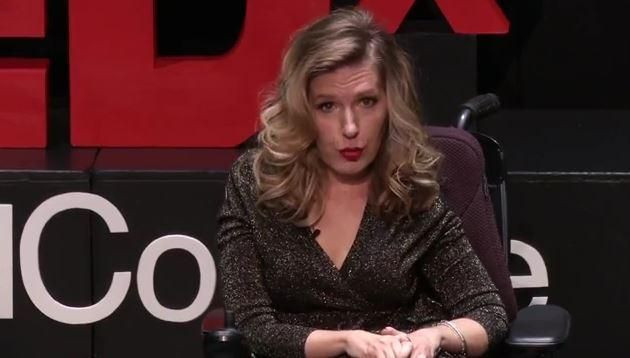Dateable Self-Esteem: Danielle Sheypuk, Ms. Wheelchair NY, Discusses The Evolution Of Sex In The City

There is self-esteem and then there’s “dateable self-esteem,” Dr. Danielle Sheypuk told me.
We are sitting at her kitchen table inside her apartment, which I immediately noticed is the kind that lacks any sign of the grimy dust that floats in on the urban air and settles over everything. The living room is flooded with evening sunlight that glimmers off a flatscreen TV while highlighting the sturdy yet comfortable furniture. We are two women wearing our comfortable after-work clothes and chatting over chocolates set out on a plate. One difference: She sits in a wheelchair, and I do not.
“People are under the misconception that if you’re happy with yourself or your life, then the dating and romance will come easy. But I find the opposite will be the case sometimes,” she said, explaining that people can be really happy with their lives, their friends, and their careers but have a really different attitude about themselves as a romantic partner.
This fork in the road between regular self-esteem and dateable self-esteem must apply to just about everyone, I say, whether they are disabled or not.
Sheypuk laughed. Recently, she spoke at the Apollo Theater about this subject and a group of women came up afterward to say, “We soooo relate … That’s us.” These were women without disabilities, she said. But how would she know whether they had disabilities?
After all, that’s her main point about the unfairness of the dating scene. Sheypuk’s own mobility impairment is visible from the start, yet all sorts of people have invisible disabilities. The only difference is they can wait till someone knows them better before mentioning it — in many cases, they can wait until someone has fallen in love with them. But Sheypuk, who prefers to discuss other aspects of her life first, must immediately begin the conversation with talking about her disability.
If you have some invisible issue, she said, “you’re still bringing that to the picture… What’s the difference between my disability and someone who has a bipolar disorder?”

Spinal Muscular Atrophy
Sheypuk grew up in Scranton, Penn., where her parents still live. “My dad does real estate and my mom was a stay-at-home mom,” she said. Sheypuk, who is attractive without makeup, smiles a lot and genuinely. She has one sister, an anesthesiologist in the Air Force who is based in Ohio. Only two years younger, her sister often visits New York. “We’re really close,” Sheypuk said.
Her parents told her that when she was a baby she would walk on her knees and crawl, but when she would try to stand up, she could never get all the way up. These signs, Sheypuk says, suggest her condition is between the strongest and next strongest of three separate types of spinal muscular atrophy (SMA), a diagnosis she received around the age of 2 or 3. “I think it’s important to put it’s a congenital disability,” she instructed me.
While she got her first wheelchair in kindergarten, she recently noticed at the SMA convention that they’re now giving wheelchairs to kids who are younger. “I saw children who were 1 or 2 in wheelchairs,” she explained “and they were really happy just to wheel around wherever they wanted, and not have to be carried.”
I asked if she was uncomfortable discussing this. She shrugged. “It’s important.” she said. “People with disabilities are often not ‘poor me’ focused. We’re more focused on integrating and living our lives despite having something that makes it difficult to sometimes pursue what we want.”
Among her many pursuits is the title of Ms. Wheelchair NY, which she won in 2012.
“My friend told me about the pageant, she found it online, and the website said it encouraged both ‘glamorousness and academic excellence,’” she said, laughing. With glamour as part of the equation, Sheypuk decided to give the contest a whirl. Today, she uses her title to talk about other decidedly less glamorous issues that concern her.
Crossing the Bridge
Having earned her PhD in psychology from the New School, she is a licensed clinical psychologist who speaks with authority. She works in the office of a mental health clinic yet also sees private patients via Skype-based sessions. When I asked if she started using Skype because of her disability or because she’s just a smart business woman, she told me it was a mix of both.
Skype sessions are just as effective as in-person therapy, she feels, but mostly it’s easier, especially for many of her clients who have a mobility impairment.
“The research says people with disabilities don’t see the gynecologist as often, they don’t go to the dentist as often,” she said. The reason, as she sees it, is these visits take a great deal of effort for people who cannot climb onto an exam table unassisted or who find navigating an office bathroom problematic. With Skype sessions, clients who need their breathing mechanisms adjusted from time to time can attend to it privately at home mid-session. Other disabled clients who may be having a bad day can talk to her from their beds.
Equally important, Skype “gives privacy to a population that doesn’t have much privacy,” Sheypuk said, explaining how people with mobility impairments are constantly in the company of caregivers, family members, assistants, or home attendants. It’s not easy for them to “not have to tell anyone anything” if they decide they want to see a counselor. With Skype sessions, her clients can say they are talking to a friend on the Internet, close the door, and have a 50-minute private therapy consultation with her.
This helps people overcome the stigma of counseling, Sheypuk believes, and it has also helped her tap into a group of people who otherwise might not try therapy. Having to tell someone else about it would be too much, and without Skype, “they just wouldn’t cross that bridge,” she said. Yet, they want and need therapy, so they can discuss what ails them. In many cases, that includes their unmet sexual needs.
Repressed Without Knowing It
During her TED Talk, Sheypuk says there are 57 million disabled people in the U.S. with $220 billion in disposable income. Why, then, are they rarely seen in the media? Why aren’t advertisers clamoring to get their dollars?
It is because sex sells and disabled people are commonly seen as unsexy, she explained, yet nothing could be further from the truth.
Sheypuk works with clients who have congenital disabilities and acquired disabilities (multiple sclerosis, for example), yet many of them wish for sexual connection. They have needs, just as others do. And, despite their medical issues, many of their sexual issues are exactly the same as the ones confronted by people without disabilities.
“To have that need met is innate to our humanity,” Sheypuk said. “Sometimes I look at it as one of our ADLs (activities of daily living). It’s the same as needing to eat or sleep or bathe. At some point, if you have a sex drive, it needs to be fulfilled.”
Worldwide, sexual rights for the disabled community are beginning to see the light of day. Touching Base, a group based in New South Wales, Australia (where sex work is decriminalized), offers a list of disability-friendly sex service providers. Meanwhile, White Hands is a nonprofit organization working “to resolve the issue of disability and sexuality in Japan.” Interestingly, White Hands provides services for men only, while Touching Base extends its services to all.
When asked how people who had a sex life before acquiring a disability compare to those with a congenital disability, Sheypuk says people who become disabled later on are more in touch with themselves as a sexual person. Having once been able-bodied, their sexual self was recognized, validated, and encouraged to come forth.
Sheypuk added that she received certain messages growing up, which were intended to support aspects of herself other than her sexuality. “You do so well in school, you have a lot of friends, not everything is about dating, not everything is about romance, you don’t need that,” she said, imitating the overly-kind voice of an encouraging parent.
“But wait,” Sheypuk said, returning to her natural voice, “that’s part of human development to experience that. Everyone needs that.”
Essentially, then, people with congenital disabilities are repressed. Even if a person does not really know the root of the problem, “you know that something is missing and you’re trying to fill that need,” she said.
So, given the situation of having a disability, what are the main obstacles a person with a disability faces when trying to meet their sexual needs?
The Right Partner
A lot of it is sheer logistics, Sheypuk explains. Though privacy (for someone who needs caretakers) and mobility are two of the most obvious difficulties, another challenge is finding a suitable romantic partner. She, herself, is well-acquainted with this problem, which inspired her term "dateable self-esteem." Open, these days, to dating anyone, whether disabled or able-bodied, she feels she has evolved to her current free-minded perspective through the whole process of moving to New York, going to grad school, getting involved in online dating, and then realizing it was harder for her than for her friends.
But, she says, it shouldn’t be.
After all, as a society, we’re “throwing away our views of sex, which are becoming antiquated,” she said. The old views suggest a rigid prototype of what sex should be: a rigorous, pleasurable form of exercise — if we were to believe only pornos and magazines, she said — that can be enjoyed only by the very beautiful and very fit.
Meanwhile, dating and romance have taken on a new tone. We’re starting to think outside the box about both romance and sex, she says, citing gay marriage as clear evidence of that. Today, sex can be whatever we need.
So, why shouldn’t the disabled be included since, Sheypuk said, “we are great at thinking creatively” having learned to navigate a world that’s not meant for wheelchairs? People with disabilities might add a lot to the discussion of what sex could be since they are “not bound by the constraints of what sex should be.” Ultimately, inclusion would be healthy for everyone.
“I think a new definition of sex and a new definition of intimacy will evolve over time,” Sheypuk said. “Don’t you?”



























